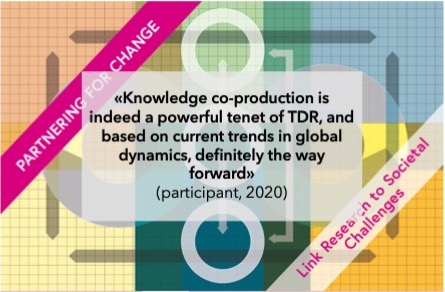Networking science.
Transdisciplinarity
What is transdisciplinary research?
As it was developed in several fields, there is not just one way to explain what transdisciplinary research is. When focusing on addressing societal challenges, it aims at transgressing boundaries between scientific disciplines as well as between science and practice. It does so to develop knowledge that can help to solve, mitigate, or prevent societal challenges. In a nutshell, transdisciplinary research links societal problem solving with scientific knowledge production in a process of co-producing knowledge.
Why transdisciplinary research?
In today's world, we face complex challenges. Science is increasingly requested to find approaches to help to overcome them. But what kind of knowledge and research can help to address such complex societal challenges? Transdisciplinary research is increasingly seen as a promising approach to achieve this goal, as it integrates different perspectives, including different academic disciplines and non-academic knowledge. It brings together scientists, decision-makers, and affected people to analyse the problems, develop what they envision as desirable futures, and work on strategies and actions supporting the necessary changes.
What does TD-Research create?
In order to help to overcome societal challenges transdisciplinary research does not only create knowledge to understand a problem. It also generates knowledge that helps to overcome the problem. Therefore, it is important to produce three different kinds of knowledge: ‘Systems knowledge’ refers to analytical and descriptive knowledge about the actual state of the system. With ‘target knowledge’ we describe knowledge about desired future developments of the system. Finally, ‘transformation knowledge’ refers the knowledge about how we can move from the actual state to the more desirable state.
td-net
House of Academies
Laupenstrasse 7
P.O. Box
3001 Bern
Switzerland
Links
